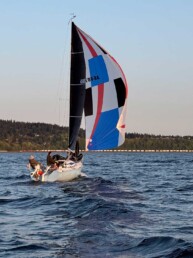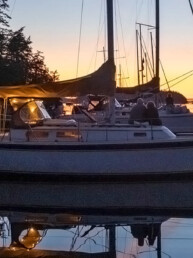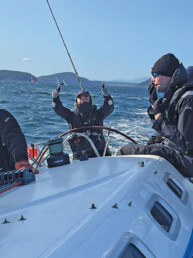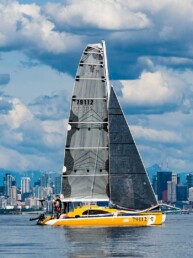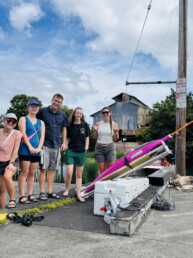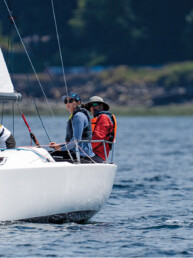From the April 2021 issue of 48° North.
Editor’s Note: Diesel engine maintenance and repair can be a conundrum. Can and should boaters learn the basics and be able to do much of the work ourselves? Absolutely. Still, there are many circumstances where we need the assistance of a professional mechanic. This month, 48° North is happy to introduce a new columnist, Meredith Anderson. Her experience as a mechanic is varied and deep, and she has developed a following for her ability to fix her clients’ engines while also helping them understand what she’s doing and why. In her new 48° North column, she will share some of this expertise with you, illuminating aspects of diesel engines that are commonly misunderstood or overlooked. This month, we’ll start with some of her impressive backstory.
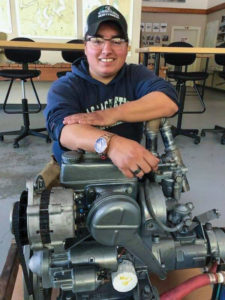
All boaters have been there… we head to the marina, excited for a day sail or a weekend cruise and our boat’s engine won’t start. It’s bad enough to be stuck at the dock, but it’s worse to be out on the water drifting towards that rocky shore!
Many boaters rely on a marine mechanic to come down and magically fix the problem. That, however, comes at a price; and those of us who love sailing or motoring our boats in remote places usually can’t just call a tow boat to haul us to the nearest shop. Even if help is available, professionally completed work often leaves you with the question: What on earth went wrong and how can I fix it in the future? I realized I could improve those circumstances by repairing engines for other boaters and, more importantly, helping them understand their diesels more thoroughly in the first place.
I was 4 years old visiting family friends with my parents and, as usual, I was bored with the adults talking about adult things. That family friend was an engineer named Cornell who took me to his garage and set my brother and I up with two carburetors out of an older Karmann Ghia to take apart and play with to keep us busy. My brother lost interest pretty quickly, but I was obsessed. I had no idea what a carburetor was, but I remember taking out the tiny screws and opening it up to find all kinds of tiny parts inside. It was even more fun trying to remember how to put it back together once I had it all laid out on the workbench.
It was years later in middle school when another family friend introduced me to the automotive industry in his own European Auto Shop. I started as an apprentice, working every day after school changing oil, brakes, and other small jobs. I rebuilt my first engine out of an older Volvo sedan in that shop, and my love for engines grew immensely.
By the time I entered high school, I was introduced to Sea Scouts, specifically the Charles N. Curtis (Sea Scout Ship 110 in Tacoma) which was an 80-foot retired Coast Guard cutter that served as a rumrunner during the days of prohibition. The Curtis had a larger engine room equipped with two Detroit Diesel 6-71s, a Detroit Diesel 2-71 genset, and another Isuzu genset. I worked my way up through the program earning my Quartermaster award and becoming the Chief Engineer aboard the Curtis. We were a passenger-for-hire vessel, and every summer we sailed through the San Juans and up into Canada with customers onboard. I learned how to fix everything on that boat from the plumbing to the engines themselves. I had finally found my calling — to become a marine engineer aboard a commercial vessel.
I entered Massachusetts Maritime Academy in 2009 as a marine engineering cadet. I passed boot camp and entered the United States Coast Guard’s MARGRAD program, where I shipped out as an engineer aboard cutters and eventually the Coast Guard Academy’s training vessel, the Barque Eagle. I earned my USCG 100-ton Master’s License and my USCG 3rd Assistant Engineering license so I could ship out commercially. Ultimately, I found that this was my true calling. It would be a few years of bliss when, due to my health, I learned that working in a large engine room on massive engines would no longer be a reality for me. I was devastated to lose my dream career of shipping out commercially, and came home wondering what my next steps would be in order to move forward in this field.
Fast forward several years and I found myself working on semi trucks for large dealers. This honed in my skills as a heavy diesel mechanic and improved my confidence on the future of diesel engines. Semi trucks are a completely different ballgame compared to boats. Over-the-highway vehicles and other heavy equipment are held to a higher standard for emissions and performance than boats ever have been — especially recreational boats. While I enjoyed what I did in that job, it was not the right fit for me. I began to search around for an opportunity to work on the water again.
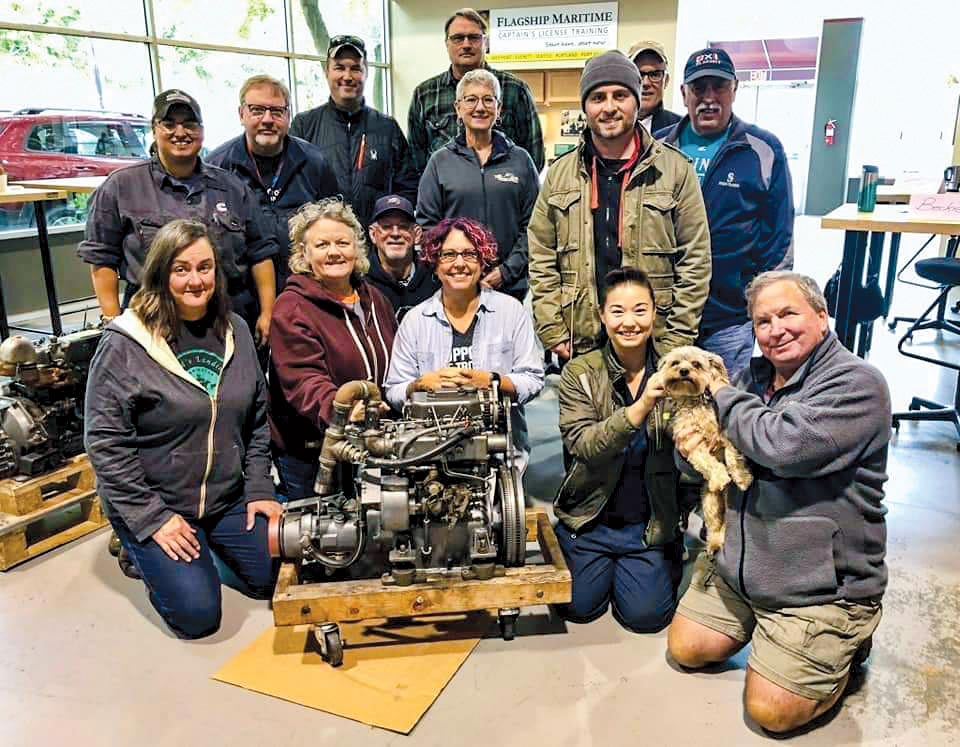
I quickly found a gig at a boatyard in northern Washington and started as a marine diesel mechanic. Compared to trucks, working on boats again was almost a step back in time. As a truck mechanic, I had been engrossed in the diagnostic and repair of electrically controlled engines, emissions systems, multiplex wiring and other challenges. The transition to boats was immediately fulfilling, and most recreational engines were purely mechanical and thus very easy to work on using only basic hand tools. I was able to easily diagnose and repair everything that came my direction.
I was also one of the few certified diesel mechanics that any of the boatyards had seen and tended to get the best jobs since most of my co-workers did not have my specialization. Within weeks, however, I saw a dark side of the recreational marine industry. Just like in the automotive world, I noticed how easily shops could take advantage of customers because many folks did not know enough about their engines to ask the right questions or understand what was really needed. It was with this in mind that I quickly decided to set out on my own. It was important to me to make sure that the recommendations and completed work met my personal standards for integrity, and I discovered I enjoyed teaching boaters around the Pacific Northwest about their marine diesel engines.
The jump from working for an employer to running my own business was a tough one and still is. Nonetheless, it has been extremely rewarding to watch my customers grow into more knowledgeable boat owners who are no longer afraid of working on their engines and are able to ask better questions about the potentially expensive work that might be done on their boats. It is a great feeling when I see a customer get involved, sometimes even taking the tools out of my hands to do the job on their own. I literally watch their fear begin to disappear!
Over the years, I have faced criticism from some male counterparts and even a female or two. People sometimes believe that because I’m female, I won’t be able to get the job done — physically or mentally. As the only woman in the shops I have worked in, I found I had to work twice as hard to gain the respect of my coworkers or superiors. On the other hand, my experience working on my own has been that customers are extremely welcoming and excited for me to get started on their engine projects (or for us to work on them together). I have taught several hands-on classes now, and have been grateful to discover that both men and women are eager to learn from me.
When I teach boaters about marine diesels and other onboard skills, I offer them valuable aspects of seamanship: the ability to be self-sufficient and the ability to operate safely. Having the opportunity to help others achieve those things is more than a job to me. Other mechanics can sometimes be hesitant to teach their customers how to change their fuel filters or change their oil, and I can understand why they might feel that way. But to me, those are fundamental skills for all boaters, because I cannot always be there to bleed the fuel system for you as you drift towards that rocky shore!
I have made many amazing friends along the way and, through one of them, was finally able to buy my own sailboat that I could work on and improve. It has also made a difference in how I approach a diagnosis or repair for a customer, since I can say I personally understand what they are going through.
I have always had a passion for engines, but it has only been in the past few years that I’ve discovered my passion to help others to be safe out on their own adventures, know the right questions to ask when faced with a potentially expensive repair, and to have confidence when it comes to working on their own boat. There will always be folks who want to just hire someone to fix a problem, and that’s ok too; but my column will be geared towards those of you who want a deeper understanding of your engines and, better yet, those who want to jump in and get your hands dirty.

